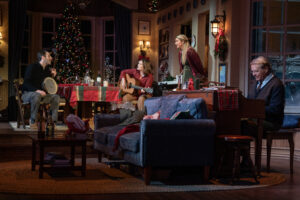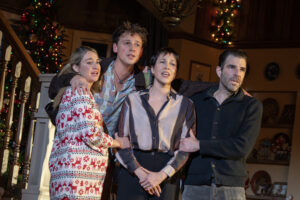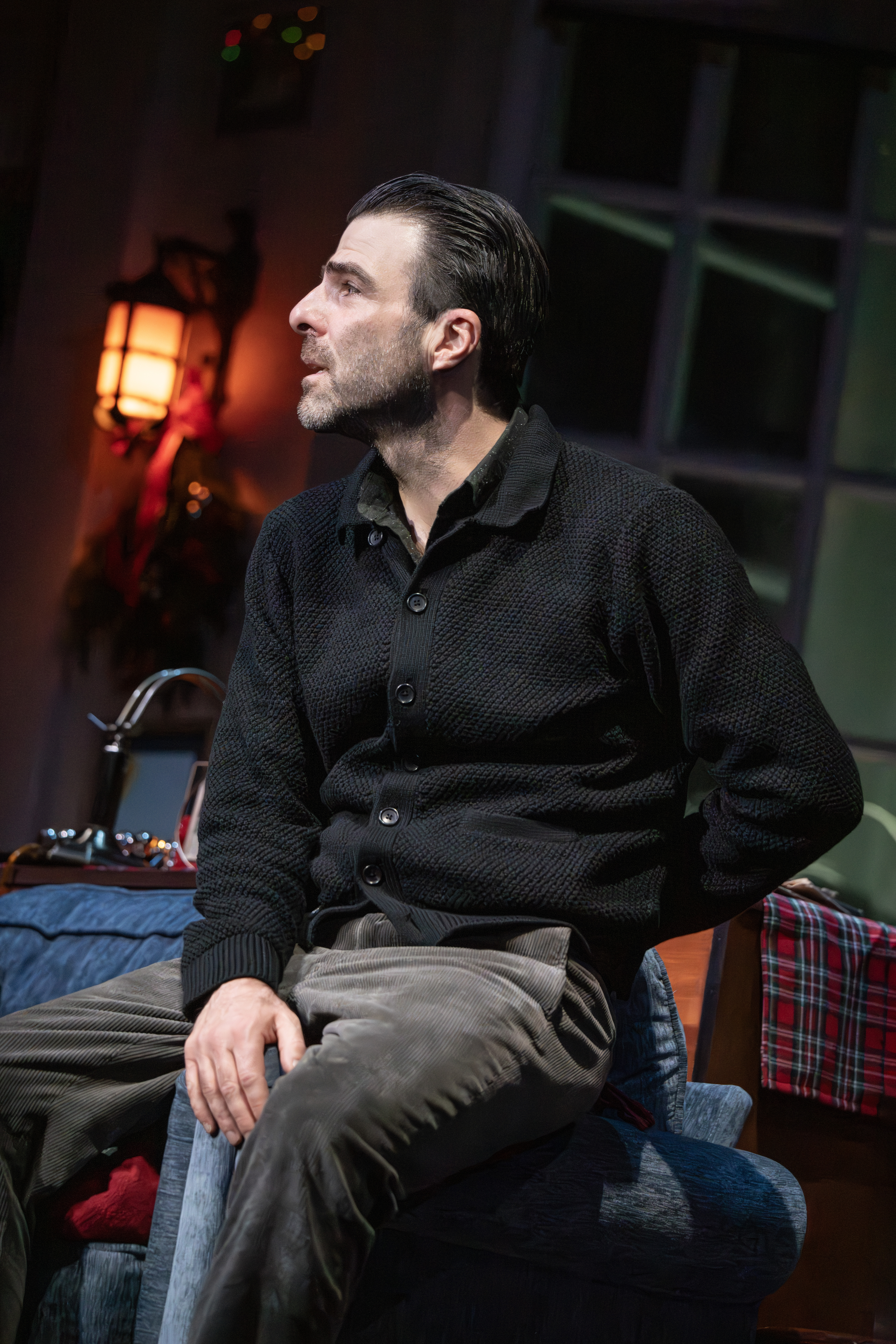Home for the Holidays
BY CHRISTOPHER BYRNE
“Cult of Love” is an apt metaphor for a family. It’s also the trenchant title of Leslye Headland’s exquisite new family drama now at Second Stage. In this case the object of veneration at the center of the cult is not an individual but the concept of the family itself. Cult members—along with wives, partners, and visitors—are drawn in by its seemingly inexorable, gravitational pull, which proves, even when it’s a toxic environment that it is inescapable.

Were it not for this meta commentary, Cult of Love would be another family drama where members gather for the Christmas holiday (or, pick any reason, actually), old scars are opened, long-simmering resentments aired, and catharsis is in the air. Granted, it would be an excellent version of this genre, but what sets Headland’s play apart is the exploration of the love that underpins all the calamity and chaos. While adult children may seethe at perceived slights from their formative years, the one thing that can never be escaped—nor fully understood by those on the outside—of the emotional ties that bind a family with an unbreakable bond.
As the Dahl family gathers on Christmas Eve in their picture perfect Connecticut farmhouse in full House and Garden regalia (meticulously rendered in John Lee Beatty’s set), we find matriarch Ginny struggling to make this Christmas the same as every one before it, even as she is in deep denial over her husband Bill’s advancing dementia. Eldest son, Mark, who abandoned his Episcopal faith (even graduating from seminary) to become a lawyer and his wife Rachel are struggling. Sister Evie has arrived with her new wife, whom Ginny can’t accept, causing strife, while relatively recently sober Johnny arrives with a newly sober friend Loren, and youngest sister Diane is have a psychotic break, imagining herself as a prophet. What binds this family, in part, is music, and they sing together marvelously, truly, it seems, at home in themselves and with each other as they sing. There are inside family jokes—such as in pronouncing “lamb” with a “b”—and even under the strain, we see the dynamic and closeness growing up together forges. These are all deeply flawed individuals, each in their own kind of hell, but there is also part of tied to their shared history, which is also endemic to their identities.

Playwright Headland understands this family drama deeply, even down to the common personality characteristics often determined by birth order in a family, and she knows how in times of stress some of those deeper characteristics can’t help but emerge. She also writes dialogue way people really speak, which is always appreciated.
The 105-minute play moves quickly, and deftly directed by Trip Cullman, the evening unfolds and builds in ways that might be somewhat predictable (particularly for those of us who have lived versions of this at various times in our lives) ways, but it always rings true, and despite the emotional complexity of the piece, it never feels forced, no small accomplishment.

The cast is outstanding. Mare Winningham as Ginny is poignant as a woman in denial who is so desperate and struggling to hold onto the past and on some levels preserve the holiday in a kind of remembered amber, as if her family had never changed from her best times. David Rasche as Bill is blithely unaware of his increasing incapacity, even as the children are trying to address it with their mother—who’ll hear none of it—and one another.
As the children, Zachary Quinto (profiled in our Winter issue as the star of the NBC series Brilliant Minds) as Mark gives a really nuanced performance as a man nearing, or in, midlife, who has yet to find himself. Molly Bernard as Rachel his wife is highly convincing as the more successful of the two, trying to be loving and patient.
Rebecca Henderson as Evie is still the second child looking for approval for herself and her wife, desperately wanting her mother’s approval. Roberta Colindrez as her wife Pippa, is excellent, thrown into this familial vortex for the first time and trying to balance it all.
Christopher Sears as Johnny is the exuberant third child who his forgiven what the older siblings think of as irresponsibility, but who also has the growing clarity of sobriety that allows him to tell the truth. Along with his friend Loren, the outstanding Barbie Ferreira, this is some of the best writing about recovery we’ve seen recently.
Shailene Woodley as Diana is aggressively fragile as a woman who mistakes a mental breakdown for divine inspiration, and Christopher Lowell is conflicted as her husband forced into a horrible choice where loss is inevitable.
Families are complex organisms, a part of life that is often incomprehensible. Yet it is that universal mass of emotions, contradictions, and steely bonds that unite us all in these messes—that keep us tied to the cult.
Cult of Love
Sceond Stage at the Hayes Theater
220 West 44th Street, New York
Tues-Sat 7 p.m.; Weds, Sat, Sun 2 p.m.
$99 and up here
1 hour, 45 mins, no intermission
Production photos by Joan Marcus
Posted, December 22, 2024









More Stories
Broadway Review: Art
Fall Arts Preview: Emus, Foxes and Eric Clapton, Too
Diane DiMassa Book Event September 25